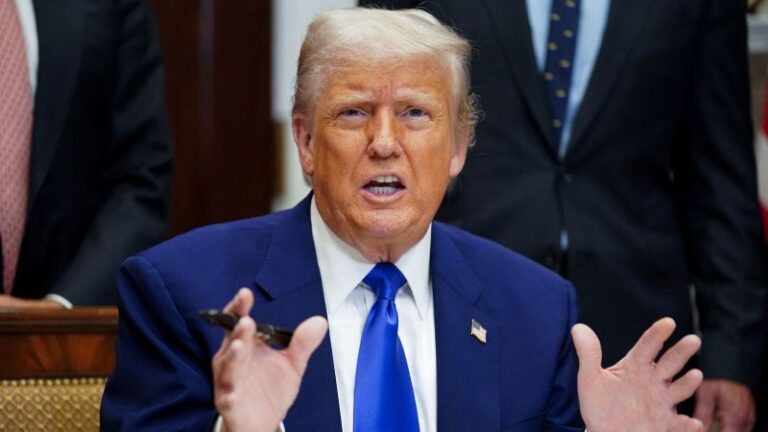President Donald Trump is ratcheting up the pressure on major drugmakers to bring their US prices in line with the far lower ones available to patients in other countries.
Trump sent letters to 17 major pharmaceutical company CEOs on Thursday with a list of demands, including that the manufacturers extend so-called “Most Favored Nation” pricing — the lowest price paid for a drug in a peer country — to all drugs provided to Medicaid enrollees. He also wants the companies to guarantee that Medicaid, Medicare and commercial-market insurers pay such prices for all new drugs. The president gave the companies 60 days to comply.
The directive stems from an executive order Trump signed in May, when he demanded drugmakers start offering US patients those lower prices or face consequences. Prices for some brand name drugs in the US are more than three times those in other developed nations, according to the administration.
In that executive order, he also directed the Department of Health and Human Services to come up with price targets within 30 days. But Trump implied that the discussions between HHS officials and the companies did not yield acceptable results.
“Most proposals my administration has received to ‘resolve’ this critical issue promised more of the same: shifting blame and requesting policy changes that would result in billions of dollars in handouts to industry,” he wrote in the letters, which were posted on Truth Social. “Moving forward, the only thing I will accept from drug manufacturers is a commitment that provides American families immediate relief from the vastly inflated drug prices and an end to the free ride of American innovation by European and other developed nations.”
“But if you refuse to step up, we will deploy every tool in our arsenal to protect American families from continued abusive drug pricing practices,” he continued. “Americans are demanding lower drug prices, and they need them today.”
The May executive order outlined some potential ramifications if manufacturers do not make significant progress in lowering prices. Those included directing HHS to craft a rule implementing the policy, allowing more drug importation into the US, reviewing drug exports, and having the Food and Drug Administration modify or revoke approvals granted for drugs that may be “unsafe, ineffective, or improperly marketed.”
The Pharmaceutical Research and Manufacturers of America, the industry’s main trade association, did not immediately return a request for comment. The stock prices for several of the companies that received the letters, including Eli Lilly, Merck, Johnson & Johnson, GSK and Amgen, slipped between 1% to 4% in mid-afternoon trading. The S&P 500 Pharmaceuticals Industry Index was down a little more than 2%.
It’s unclear what authority the president has to demand certain prices, particularly in the private market and without Congress’ involvement. Some industry experts have described the May executive order as more bark than bite.
Trump’s effort to establish a “Most Favored Nation” rule for certain drugs in Medicare during his first term was quickly blocked by federal courts for procedural reasons before being rescinded by then-President Joe Biden in 2021. The May executive order goes far beyond that measure since it is not limited to drugs purchased by Medicare nor to a certain number of pharmaceuticals.
In the letters, Trump also demanded that drug companies return revenue from operations abroad to lower prices in America through “an explicit agreement with the United States.” Plus, he ordered the manufacturers to participate in programs to sell certain drugs directly to consumers or business at “Most Favored Nation” prices.
Drugmakers have long complained that foreign governments, which are more involved in price setting, demand very low prices to gain access to their markets.
It’s not the only way the Trump administration is squeezing drugmakers — officials have also looked to impose tariffs on pharmaceutical imports, which had been exempted from such levies enacted during the president’s first term. The tariffs could exacerbate shortages of certain drugs, particularly generic medicines, and eventually raise prices, experts have warned.


